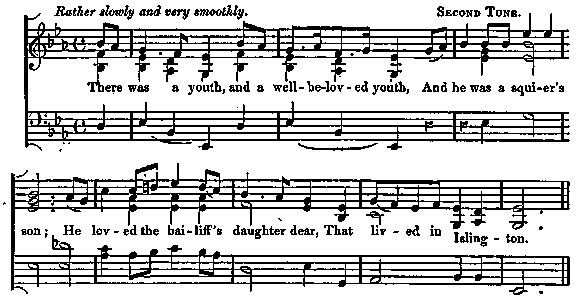Popular Music Of The Olden Time Vol 1
Ancient Songs, Ballads, & Dance Tunes, Sheet Music & Lyrics - online book
| Share page | Visit Us On FB |
|
204 ENGLISH SONG AND BALLAD MUSIC |
|||
|
She started up with a colour so red, Catching hold of his bridle-rein;
One penny, one penny, kind sir, she said, Will ease me of much pain.
Before I give you one penny, sweet-heart, Pray tell me where you were horn:
At Islington, kind Sir, said she, Where I have had many a scorn.
I prythee, sweet-heart, tell to me,
O tell me whether you know The bailiff's daughter of Islington ?
She is dead, Sir, long ago. |
If she be dead, then take my horse,
My saddle and bridle also; For I will into some far country,
Where no man shall me know.
O stay, O stay, thou goodly youth,
She standeth by thy side; She is here alive, she is not dead,
And ready to he thy bride.
O farewell grief, and welcome joy,
Ten thousand times therefore; For now I have found mine own true love,
Whom I thought I should never see more. |
||
|
|
|||
 |
|||
|
|
|||
|
IT WAS A LOVEB AND HIS LASS. From a quarto MS., which has successively passed through the hands of Mr. Cranston, Dr. John Leyden, and. Mr. Heber; and is now in the Advocates' Library, Edinburgh. It contains about thirty-four songs with words,* and sixteen song and dance tunes without. The latter part of the manuscript, which bears the name of a former proprietor, William Stirling, and the date of May, 1639, consists of Psalm Tunes, evidently in the same handwriting, and written about the same time as the earlier portion. This song is in the comedy of As you like it, the first edition of which was printed in 1623; and the inaccuracies in that copy, which have given much trouble to commentators on Shakespeare, are not to be found in this. In the printed copy, the last verse stands in the place of the second: this was first observed and remedied by Dr. Thirlby; and the words " ring time," there rendered "rang time," and by commentators altered to "rank time," were first restored to the proper meaning by Steevens, who explains them as signifying the aptest season for marriage. The words are here printed from the |
|||
|
|
|||
|
■ Among these are Wither's song, " Shall I, wasting in despair," and " Farewell, dear love," quoted in Twelfth Night, the music of which, by Robert Jones (twelfth from his first book, published in 1601) is reprinted in Musica |
Antiqua: a Selection of Music from the commencement of the twelfth to the beginning of the eighteenth century, Sic. edited by John Stafford Smith. |
||